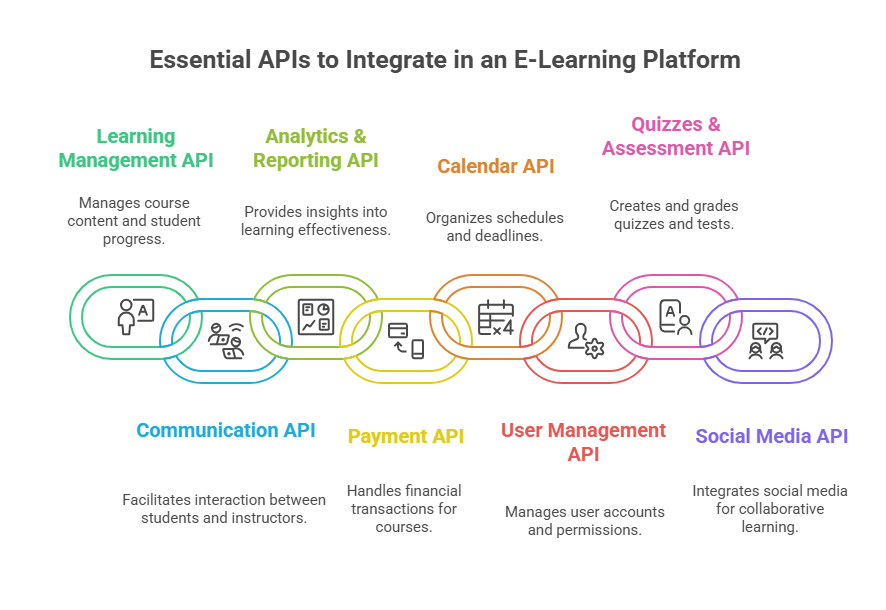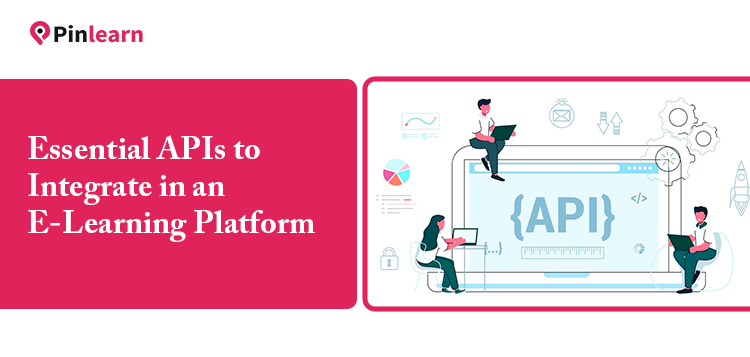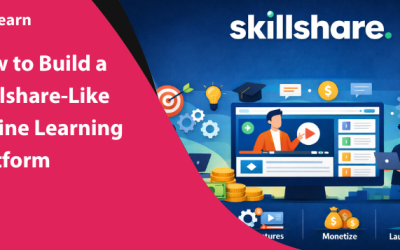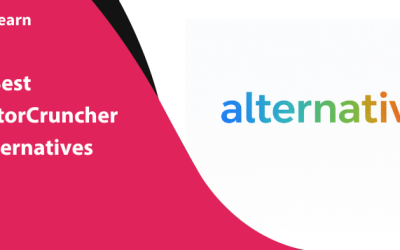Essential APIs to Integrate in an E-Learning Platform
Planning to build a feature-rich e-learning platform that stands out? Well, you don’t have to build all the features from scratch! APIs are game-changing tools that can quickly integrate the feature with your e-learning platform.
Whether you need a payment gateway or mailing system, there’s now an API for everything! This way you can skip reinventing the wheel! Just a bit of groundwork finding out the right API for your business needs!
But, we are done with the heavy lifting for you! This blog lists the essential APIs for your e-learning platform for a power-packed learning experience.
So, are you ready to make an impact in the e-learning world?
Different Types of API Integrations for E-learning Platforms
APIs extend the functionality of your e-learning platform. They help in integrating diverse features to make the learning experience rich and powerful.
From video conferencing to data analytics, there’s a whole lot of APIs to explore.
Here are the essential API integrations for your e-learning platform!

1. Learning Management APIs
Learning Management APIs integrate with external LMS. It comprises a set of tools or protocols that connect systems and allow seamless exchange of data.
Moodle Web Services
Moodle is one of the most-widely LMS platforms. If you want to connect with Moodle and avail some of its services, Moodle Web Services makes it possible. It supports REST, SOAP, XML-RPC protocols.
Features: Create & manage users, enroll users for courses, track course completion and grades
Canvas LMS API
Canvas uses a REST API to access and modify data externally on your e-learning platform.
Features: Course and user management, assignments, grading, calendar and scheduling
2. Communication API
Imagine your e-learning platform without audio and video interactions. Feels surreal, right? For a well-rounded learning experience, you need to integrate seamless audio and video into your platform.
Virtual Classroom, real-time messaging, and live streaming enrich the overall learning experience. Communication APIs allow synchronous and asynchronous communication. This fosters better interactions and collaboration between learners and instructors.
Zoom API
The luminescent Zoom screens have been an essential part of online learning. Zoom API is one of the top choices for one-to-one or group learning sessions and webinars.
Features: 1-on-1 and group video meetings, text chats, webhooks, screen-sharing, high participant limit
💡 Important: Why is Zoom the ideal solution for your live tutoring website?
Twilio API
Twilio is another popular video API for e-learning. It offers superior quality voice and video quality for learning sessions. Like Zoom, it allows hosting both one-on-one and video meetings. The API is customizable and scalable as per your session requirements.
Features: Chats, Screen sharing, interactive background, secure cloud storage
Google Meet
Another simpler alternative, Google Meet, is a powerful choice for an enriching learning experience. It supports video meetings, webinars, and events. From live streaming to breakout rooms, instructors can enhance the learning experience.
Features: Video and audio conferencing, screen sharing, polls, and Q&A, collaboration tools
SendGrid(Email)
Be it reminders or nudges to complete courses, emails work their own charm! They boost engagement and course completion rates.
Sendgrid API helps to set up and manage email systems within your platform.
For instance, instructors can send course materials, inform about unexpected changes in session timings, or learner progress through emails.
Features: Automated email sequence, real-time analytics, dynamic templates, and powerful integrations
3. Analytics & Reporting API
Whether you’re building an internal dashboard or extending your LMS, an analytics and reporting API is helpful. Admin can track their platform performance based on various metrics.
For example, platform usage, course engagement, and revenue are a few essential metrics to track. Power BI dashboards are one of the popular APIs for custom reporting. It helps to showcase data with visualizations and graphics.
Google Analytics (GA 4)
Does your e-learning website get enough traffic? Integrate it with Google Analytics API (GA 4) to get insights on traffic and user behaviour data like page views, page clicks, and bounce rates.
Use Cases:
- Track your course landing page performance
- Performance of e-commerce initiative
- Evaluate user journey
- Measure course engagement & completion
- Understand user demographics & behaviour
MixPanel
If you want to track your learner’s behaviour closely, Mixpanel API is a powerful tool. From identifying patterns to the best features, it’s a versatile tool.
Once you understand the preferences and needs of your audience, it becomes easier to design a personalized learning experience.
Use Cases:
- Tracking course completion
- Researching more on conversions
- Find drop-off points along the course
- Course recommendations based on behaviour
Custom-reporting API
| Key Reports | Description |
| Learner Engagement | Track how far learners engaged with courses or tutoring sessions |
| Course Performance | Enrollments, completion, and drop-offs |
| Assessments | Quiz scores, attempts, |
| Revenue | Revenue per course, course sales, |
| Certificate | Learners who earned certificates |
| Learner Management | Registered learners, active & inactive learners |
| Instructor/Tutor Management | Registered Instructors, approved instructors |
4. Payment API
Choose a payment gateway based on your platform offerings.
For example, if your platform offers a subscription, integrate with a gateway with subscription support. Ensure it is PCI-DSS compliant and supports multiple payment methods.
Stripe API
Stripe is one of the leading payment gateways chosen by prominent platforms like Kajabi, Thinkific, Teachable, and others.
It supports both one-time purchases and subscriptions. It supports popular payment methods like Visa, mastercard, digital wallets, and more.
Features: One-time payments, subscriptions, customization, documentation, fraud management
PayPal API
If you’re looking for a simpler API to manage your payments, PayPal is a great option. It is user-friendly and supports over 100 currencies across the globe. It also offers great customer support for chargeback and dispute resolution.
Features: Easy-to-integrate, chargeback and dispute resolution, multi-currency support, security
Authorize.net
One of the oldest payment gateways, Authorize.net, still offers easy integration with your platform. From one-time to recurring and even mobile payments, the payment API supports it all.
Features: Multi-currency support, PCI-DSS compliant, security and fraud prevention
5. Calendar API Integration
Scheduling and organizing is crucial for e-learning platforms. Whether it’s for synchronizing events or sending reminders, calendar APIs streamline workflows.
You can seamlessly sync and manage data for scheduling events. Overall, this helps better time management and improved learner outcomes.
Google Calendar API
One of the most effective scheduling tools for e-learning platforms, Google Calendar API, allows syncing your data with your email. Thus, you can even import and export from your email. As a platform, it becomes easier to automate simple tasks like reminders of upcoming events, tasks, or exams.
Gmail and Google Meet support offers it a winning edge for scheduling.
Features: Create and modify events, push notifications, authentication, user permission
Microsoft Outlook Calendar API
Another widely used calendar API is Microsoft Outlook, especially for Microsoft ecosystems. Like Google Calendar, you can organize events, meetings, and tasks for your platform users.
An integrated calendar offers better communication and collaboration. The calendar API ecosystem ensures you don’t miss any deadlines or events.
Features: Outlook events, reminders, meetings, access contacts, share and delegate calendar access
6. User Management API
With user management API, the admin can create, modify accounts and manage access roles. For example, learners can enroll with the courses, and only instructors can create courses.
Single Sign-On, or SSO, is an essential concept involved here. Users can access multiple services using the same credentials. Authentication and authorization ensure the users access their content based on their role.
Auth0
Auth0 is a widely-used protocol for user and access management. It is more reliable and stable than any other method. The user access is granted with just one click. So, this is a quick and safe option.
It uses common authentication methods like JSON Web tokens, OAuth, and API keys.
Features: Authentication, authorization, social login, role access,
Firebase Authentication
Firebase helps users sign with email, Google accounts, or OAuth Token from a federated provider. It’s suitable for fast deployment of LMS.
Features: Authentication, real-time database, serverless function, cloud storage
7. Quizzes & Assessments
The true test of learning is how far learners can grasp and put the concepts into practice! Quizzes & assessments supercharge the learning experience. For example, time-limited tests, multiple-choice questions, and fill-in-the-blanks show where students stand.
For a gamified LMS, you can even add leaderboards, badges, score points, etc. In such cases, a gamified API like Kahoot could help in live or async play.
ClassMarker API
ClassMarker API is popularly used by educators to build customizable tests. It can be included in educational and corporate LMS to enrich the learning experience. Proctored tests and certification quizzes are essential to use cases.
Features: Instructor-led & auto-graded tests, group and access management, timed tests
ProPofs Quiz Maker
Another popular quiz API, ProPofs Quiz, is a powerful tool for customizable tests. From drag-and-drop questions to time-based questions, it has a host of quizzes to explore.
Features: Customizable templates, proctored tests, automatic grading, and reporting
Learnosity, Typeform, and GoogleForms API are a few other quiz APIs.
8. Social Media APIs
Social media integration could foster better user experience and business growth. You can integrate social media platforms with e-learning for user login, engagement, content sharing, and more. These APIs are helpful for building social learning communities.
Facebook API (Graph API)
Want to share your new quiz high score on Facebook? Its API makes it easier to share your recent platform updates. Admins can use it to gather insights, social login, or for tracking interactions.
Twitter (X) API
Twitter API is a powerful tool for user login, posting tweets, or engagement tracking. You could announce a new course launch or initiate a quick discussion.
Discord API
This is a great tool for creating learning communities, groups, or interactive chatbots. Thus, you can create a more engaging and collaborative environment.
Benefits of Using API in E-learning
Your e-learning platform might cater to varied goals and use case scenarios. For example, a corporate LMS might help with onboarding or compliance training. Regardless of all this, APIs extend and scale your e-learning platform’s scope.
Here’s why your e-learning platform might be incomplete without API:
-
Personalized Learning Experience
APIs collect insights on learner performance and behaviour. This helps to recommend personalized learning narratives. For instance, gamified quiz APIs could indicate your progress through scores. Based on these scores, your platform could give course recommendations or learning paths.
-
Better Integration and Interoperability
APIs connect your e-learning platform with external applications. You could connect your platform with HR systems, CRM software, or payment gateways. Thus, makes accessing & importing data from other systems easier. This ensures a more holistic learning experience!
-
Data Tracking & Analytics
Analytics & tools help to collect and assess data on learners, courses and business performance. Custom reporting API collects data on learner engagement, course assessment, and even platform revenue.
-
Increased Security and Accessibility
User management APIs manage and authorize user access. Thus, users, instructors, and staff can access only restricted modules.
Final Few Words
APIs are a powerful way of extending and scaling your e-learning platform. Integrating your e-learning platform with external apps, helps to enrich the learning experience.
For instructors, tools like video conferencing and calendar scheduling API streamline workflows. Lastly, the admin can capture and analyze their overall business performance.
So, are you looking for an e-learning solution that supports popular integrations? Pinlearn’s cutting-edge technology easily integrates with essential APIs and business tools. Thus, you can take your e-learning experience to the next level altogether! From payment gateway to live streaming and email notifications, Pinlearn covers every important API for your business!
Take a look at our live demo to understand the features and workflow! If it feels like the right solution, we can connect on a quick call!
FAQ-Related to Essential APIs to Integrate in an E-Learning Platform
1. What is an API in e-learning?
An API in e-learning is a set of rules or protocols that allows seamless communication and data exchange between your platform and external application. This helps to extend your platform’s functionality and enrich the learning experience.
2. Which are the different API integrations for your e-learning platform?
You can integrate your platform with video conferencing tools, payment gateways, authentication, analytics, quizzes, and more.
3. What are the problems to integrate API in e-learning?
Following are the challenges to integrate external APIs into e-learning:
- Platform compatibility is the topmost challenge for API integration.
- APIs increase the risk of security vulnerabilities and the risk of exposing sensitive data.
- Increased risk to security also violates the adherence to data privacy laws.
- Assessing compatibility and authorization requirements involves significant costs.





